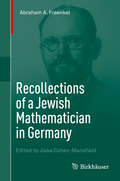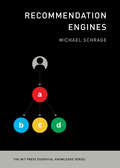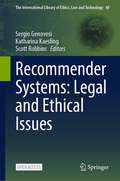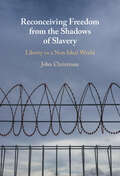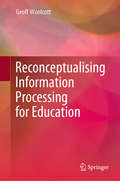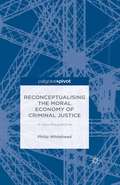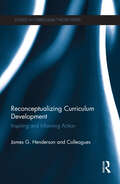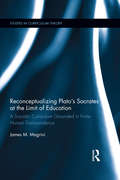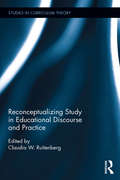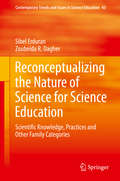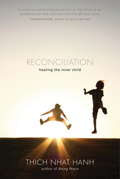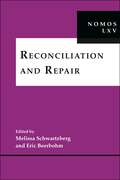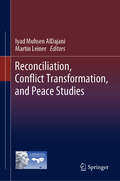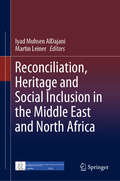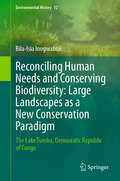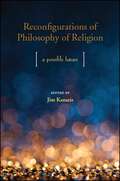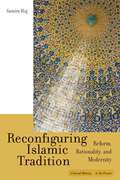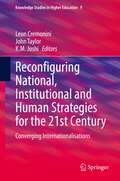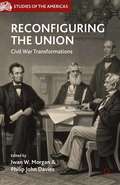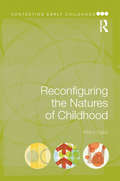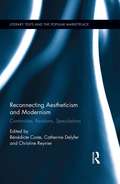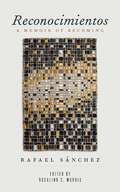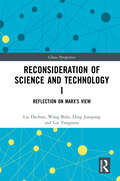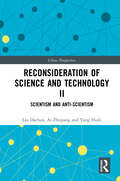- Table View
- List View
Recognizing Wrongs
by John C. Goldberg Benjamin C. ZipurskyMuch bemoaned and widely misunderstood, tort law provides an essential vehicle for injured parties to seek redress from wrongdoers and hold them accountable. John Goldberg and Benjamin Zipursky defend tort law against its critics and lay out comprehensively their increasingly influential “civil recourse” conception of tort.
Recollections of a Jewish Mathematician in Germany
by Abraham A. FraenkelJiska Cohen-MansfieldAbraham A. Fraenkel was a world-renowned mathematician in pre-Second World War Germany, whose work on set theory was fundamental to the development of modern mathematics. A friend of Albert Einstein, he knew many of the era's acclaimed mathematicians personally. He moved to Israel (then Palestine under the British Mandate) in the early 1930s. In his autobiography Fraenkel describes his early years growing up as an Orthodox Jew in Germany and his development as a mathematician at the beginning of the twentieth century. This memoir, originally written in German in the 1960s, has now been translated into English, with an additional chapter covering the period from 1933 until his death in 1965 written by the editor, Jiska Cohen-Mansfield. Fraenkel describes the world of mathematics in Germany in the first half of the twentieth century, its origins and development, the systems influencing it, and its demise. He also paints a unique picture of the complex struggles within the world of Orthodox Jewry in Germany. In his personal life, Fraenkel merged these two worlds during periods of turmoil including the two world wars and the establishment of the state of Israel. Including a new foreword by Menachem Magidor Foreword to the 1967 German edition by Yehoshua Bar-Hillel
Recommendation Engines (The MIT Press Essential Knowledge series)
by Michael SchrageHow companies like Amazon, Netflix, and Spotify know what "you might also like": the history, technology, business, and societal impact of online recommendation engines.Increasingly, our technologies are giving us better, faster, smarter, and more personal advice than our own families and best friends. Amazon already knows what kind of books and household goods you like and is more than eager to recommend more; YouTube and TikTok always have another video lined up to show you; Netflix has crunched the numbers of your viewing habits to suggest whole genres that you would enjoy. In this volume in the MIT Press's Essential Knowledge series, innovation expert Michael Schrage explains the origins, technologies, business applications, and increasing societal impact of recommendation engines, the systems that allow companies worldwide to know what products, services, and experiences "you might also like."
Recommender Systems: Legal and Ethical Issues (The International Library of Ethics, Law and Technology #40)
by Scott Robbins Katharina Kaesling Sergio GenovesiThis open access contributed volume examines the ethical and legal foundations of (future) policies on recommender systems and offers a transdisciplinary approach to tackle important issues related to their development, use and integration into online eco-systems. This volume scrutinizes the values driving automated recommendations - what is important for an individual receiving the recommendation, the company on which that platform was received, and society at large might diverge. The volume addresses concerns about manipulation of individuals and risks for personal autonomy. From a legal perspective, the volume offers a much-needed evaluation of regulatory needs and lawmakers’ answers in various legal disciplines. The focus is on European Union measures of platform regulation, consumer protection and anti-discrimination law. The volume will be of particular interest to the community of legal scholars dealing with platform regulation and algorithmic decision making. By including specific use cases, the volume also exposes pitfalls associated with current models of regulation. Beyond the juxtaposition of purely ethical and legal perspectives, the volume contains truly interdisciplinary work on various aspects of recommender systems.
Reconceiving Freedom from the Shadows of Slavery: Liberty in a Nonideal World
by John ChristmanIn a departure from standard approaches to the concept of liberty, in this book John Christman locates and defends the concept of freedom as a fundamental social value that arose out of fights against slavery and oppression. Seen in this light, liberty must be understood as requiring more than mere non-interference or non-domination – it requires the capacity for self-government and the capabilities needed to pursue valued activities, practices, and ways of life. Christman analyses the emergence of freedom as a concept through nineteenth- and twentieth-century struggles against slavery and other oppressive social forms, and argues that a specifically positive conception best reflects its origins and is philosophically defensible in its own right. What results is a model of freedom that captures its fundamental value both as central to the theoretical architecture of constitutional democracies and as an aspiration for those striving for liberation.
Reconceptualising Information Processing for Education
by Geoff WoolcottThis book presents a novel conceptualisation of universal information processing systems based on studies of environmental interaction in both biological and non-biological systems. This conceptualisation is used to demonstrate how a single overarching framework can be applied to the investigation of human learning and memory by considering matter and energy pathways and their connections. In taking a stance based on everyday interactions, as well as on scientific practices, the conceptualisation is used to consider educational theories and practices, exemplified by the widely cited cognitive load theory. In linking these theories and practices more closely to scientific thinking, the book embraces an holistic approach to informational interactions, not limited to conceptualisations of pattern, signal or meaning. The book offers educational researchers and educators an opportunity to re-think their approach to instruction – to take all facets of student learning environments into account in increasing human knowledge, skills and experiences across society.
Reconceptualising the Moral Economy of Criminal Justice: A New Perspective
by Philip WhiteheadThis book reconceptualises the concept of moral economy in its relevance for, and application to, the criminal justice system in England and Wales. It advances the argument that criminal justice cannot be reduced to an instrumentally driven operation to achieve fiscal efficiencies or provide investment opportunities to the commercial sector.
Reconceptualizing Curriculum Development: Inspiring and Informing Action (Studies in Curriculum Theory Series)
by James Henderson And ColleaguesReconceptualizing Curriculum Development provides accessible, clear guidance on curriculum problem solving and educational leadership through the practice of a synoptic curriculum study. This practice integrates three influential interpretations of curriculum—curriculum as deliberative artistry, curriculum as complicated conversation, and curriculum as currere—with John Dewey’s lifetime work on reflective inquiry. At its heart, the book advances a way of studying as a way of living with reference to the question: How might I live as a democratic educator? The study guidance is organized as an open-ended scaffolding of three embedded reflective inquiries informed by four deliberative conversations. Study recommendations are provided by a carefully selected team. The field-tested study-based approach is illustrated through a multi-layered, multi-voiced narrative collage of four experienced teachers’ personal journeys of understanding in a collegial study context. Applying William Pinar’s argument that a "conceptual montage" enabling teachers to lead complicated conversations should be the focus for curriculum development in the field’s current ‘post-reconceptualist’ moment, the book moves forward the educational aim of facilitating a holistic subject/self/social understanding through the practice of a balanced hermeneutics of suspicion and trust. It closes with a discussion of cross-cultural collaboration and advocacy, reflecting the interest of curriculum scholars in a wide range of countries in this study-based, lead-learning approach to curriculum development.
Reconceptualizing Plato’s Socrates at the Limit of Education: A Socratic Curriculum Grounded in Finite Human Transcendence (Studies in Curriculum Theory Series)
by James M. MagriniBridging the gap between interpretations of "Third Way" Platonic scholarship and "phenomenological-ontological" scholarship, this book argues for a unique ontological-hermeneutic interpretation of Plato and Plato’s Socrates. Reconceptualizing Plato’s Socrates at the Limit of Education offers a re-reading of Plato and Plato’s Socrates in terms of interpreting the practice of education as care for the soul through the conceptual lenses of phenomenology, philosophical hermeneutics, and ontological inquiry. Magrini contrasts his re-reading with the views of Plato and Plato’s Socrates that dominate contemporary education, which, for the most part, emerge through the rigid and reductive categorization of Plato as both a "realist" and "idealist" in philosophical foundations texts (teacher education programs). This view also presents what he terms the questionable "Socrates-as-teacher" model, which grounds such contemporary educational movements as the Paideia Project, which claims to incorporate, through a "scripted-curriculum" with "Socratic lesson plans," the so-called "Socratic Method" into the Common Core State Standards Curriculum as a "technical" skill that can be taught and learned as part of the students’ "critical thinking" skills. After a careful reading incorporating what might be termed a "Third Way" of reading Plato and Plato’s Socrates, following scholars from the Continental tradition, Magrini concludes that a so-called "Socratic education" would be nearly impossible to achieve and enact in the current educational milieu of standardization or neo-Taylorism (Social Efficiency). However, despite this, he argues in the affirmative that there is much educators can and must learn from this "non-doctrinal" re-reading and re-characterization of Plato and Plato’s Socrates.
Reconceptualizing Study in Educational Discourse and Practice (Studies in Curriculum Theory Series)
by Claudia W. RuitenbergAddressing studying as a distinct educational concept and phenomenon in its own right, the essays in this volume consider study and studying from a range of perspectives. Countering dominant educational discourses, which place a heavy emphasis on learning and instruction, the contributors explore questions such as: What does it mean to study something? How is studying something different from being taught about it, or learning something about it? What does the difficulty demanded by study mean for the one who studies and for the teacher? What mode of existence does study induce? The book highlights the significance of study not only, or even primarily, for its educational outcome, but as a human activity.
Reconceptualizing the Nature of Science for Science Education
by Sibel Erduran Zoubeida R. DagherPrompted by the ongoing debate among science educators over 'nature of science', and its importance in school and university curricula, this book is a clarion call for a broad re-conceptualizing of nature of science in science education. The authors draw on the 'family resemblance' approach popularized by Wittgenstein, defining science as a cognitive-epistemic and social-institutional system whose heterogeneous characteristics and influences should be more thoroughly reflected in science education. They seek wherever possible to clarify their developing thesis with visual tools that illustrate how their ideas can be practically applied in science education. The volume's holistic representation of science, which includes the aims and values, knowledge, practices, techniques, and methodological rules (as well as science's social and institutional contexts), mirrors its core aim to synthesize perspectives from the fields of philosophy of science and science education. The authors believe that this more integrated conception of nature of science in science education is both innovative and beneficial. They discuss in detail the implications for curriculum content, pedagogy, and learning outcomes, deploy numerous real-life examples, and detail the links between their ideas and curriculum policy more generally.
Reconciliation
by Thich Nhat HanhBased on Dharma talks by Zen Master Thich Nhat Hanh and insights from participants in retreats for healing the inner child, this book is an exciting contribution to the growing trend of using Buddhist practices to encourage mental health and wellness. Reconciliation focuses on the theme of mindful awareness of our emotions and healing our relationships, as well as meditations and exercises to acknowledge and transform the hurt that many of us experienced as children. The book shows how anger, sadness, and fear can become joy and tranquility by learning to breathe with, explore, meditate, and speak about our strong emotions. Reconciliation offers specific practices designed to bring healing and release for people suffering from childhood trauma. The book is written for a wide audience and accessible to people of all backgrounds and spiritual traditions.
Reconciliation and Repair: NOMOS LXV (NOMOS - American Society for Political and Legal Philosophy)
by Eric Beerbohm Melissa SchwartzbergFeatures contributions that respond to deep challenges to social cohesion from racial injusticeIn the latest installment of the NOMOS series, a distinguished group of interdisciplinary scholars explore the erosion—and potential rebuilding—of civic bonds in response to injustice, wrongdoing, and betrayal. Contributors address the possibility of reconciliation and repair, drawing on cutting-edge insights from the fields of political science, philosophy, and law. Nine timely essays explore our pivotal moment in history, from the question of reparations for slavery to the from the art—and impact—of the public apology.The editors of this volume encourage us to not only examine the roots of mistrust, but also to imagine a collective way forward, particularly as we face the continuing threat of the COVID-19 pandemic. Reconciliation and Repair provides thought-provoking perspectives in an age where they are desperately needed.
Reconciliation, Conflict Transformation, and Peace Studies
by Martin Leiner Iyad Muhsen AlDajaniThis book, achieved in cooperation with the Academic Alliance for Reconciliation Studies in the Middle East and North Africa (AARMENA), focuses on peacebuilding, conflict transformation, and shifts toward approaching the reconciliation process as an inter-, trans- and multidisciplinary field. The research presented in the series focuses on the Middle East and North Africa, highlighting contributions by practitioners and scholars alike.The book is divided into five sections:Sections 1: Theoretical and Philosophical FrameworkSection 2: Digital Humanities on Reconciliation, Conflict Transformation, and Peace StudiesSection 3: Research Science on Reconciliation, Conflict Transformation, and Peace StudiesSection 4: Practices of Studies on Reconciliation, Conflict Transformation, and Peace StudiesSection 5: Cases Studies on Reconciliation, Conflict Transformation, and Peace StudiesThe book's first part focuses on theories and the philosophical framework for the research on reconciliation, conflict transformation, and peace studies. The second part of the book is dedicated to digital humanities development in the reconciliation and peace education field, its impact on the reconciliation process in societies, and the introduction of Artificial Intelligence in analysis techniques to differentiate and identify research in different domains. The book's third part is dedicated to the research on reconciliation and conflict transformation in different disciplines. The fourth part concentrates on the practices in the field, and the fifth part illustrates case studies on reconciliation, conflict transformation, and peace studies. The target audience is professors, scholars, practitioners, students, and scientists that are experts in the field of Middle East and North Africa.
Reconciliation, Heritage and Social Inclusion in the Middle East and North Africa
by Martin Leiner Iyad Muhsen AlDajaniThis book, sponsored by the Academic Alliance for Reconciliation Studies in the Middle East and North Africa (AARMENA), focuses on peacebuilding, conflict transformation, and shifts toward approaching the reconciliation process as an inter-, trans- and multidisciplinary field. The research presented in the series focuses on the Middle East and North Africa, highlighting contributions by practitioners and scholars alike. This volume showcases research on Heritage, Reconciliation, and Social Inclusion in the Middle East and North Africa. It reflects various inter-, trans- and multidisciplinary approaches applied both theoretically and practically, and explores conflict transformation and transitional shifts towards peacebuilding and reconciliation in the MENA (Middle East and North Africa) region. The content is divided into five sections, the first of which examines the importance of reconciliation, peacebuilding, and social inclusion in contributions by experts in the field such as Martin Leiner, Wolfgang Dietrich, Mohammad Abu Nimer, Mohmmad Alshraideh and Iyad Aldajani. The second and third section explore digital humanities and the research sciences respectively, while the fourth turns to practices of heritage and reconciliation. The fifth section presents case studies on practices, conducted by expert researchers for heritage, reconciliation, and social inclusion in higher education.
Reconciling Human Needs and Conserving Biodiversity: The Lake Tumba, Democratic Republic of Congo (Environmental History #12)
by Bila-Isia InogwabiniProtected areas have often been defined as the backbones of biodiversity conservation. Protected areas have often been defined as the backbones of biodiversity conservation. However, legitimate demands formulated by countries for their economic development, growing human populations, forest fragmentations, and needs of local communities for sustainable livelihoods are also pressing demands on protected areas, stringently pressuring conservation community to identify means to reconcile long term biodiversity conservation and communities’ livelihoods. Hence, integrating conservation activities within the global framework of economic development of countries with high biodiversity had become part of conservation paradigms. Integrated development as a route to conservation, strict protected areas, community managed areas, etc. have been tried but resulted in debatable outcomes in many ways. The lukewarm nature of these results brought ‘landscape approach’ at the front of biodiversity conservation in Central Africa. Since the late 1990s the landscape approach uses large areas with different functional attributes and shifts foundational biodiversity conservation paradigms. Changes are brought to the role traditionally attributed to local communities, aligning sustainable development with conservation and stretching conservation beyond the confines of traditional protected areas. These three shifts need a holistic approach to respond to different conservation questions. There are only a few instances where the landscape experience has been scientifically documented and lessons learnt drawn into a corpus of knowledge to guide future conservation initiatives across Central Africa. To subjugate one biodiversity conservation landscape as one case study emerged as a matter of urgency to present the potential knowledge acquired throughout the landscape experiment, including leadership and management, processes tried, results (at least partially) achieved, and why such and such other process or management arrangement were been chosen among many other alternatives, etc. The challenges of the implementation of the conservation landscape approach needed also to be documented. This book responds to the majority of these questions; drawing its content from the firsthand field knowledge, it discusses these shifts and documents what has been tried, how successful (unsuccessful) it was, and what lessons learnt from these trials. Theoretical questions such as threat index, and ecological services, etc. are also discussed and gaps in knowledge are identified.
Reconfigurations of Philosophy of Religion: A Possible Future
by Jim KanarisThis collection addresses, as it exemplifies, an identity crisis in contemporary philosophy of religion. It represents a unique two-way dialogue between philosophers of religion and scholars of religion and broaches issues pertaining to the philosophy of religion and the philosophical tradition, on the one hand, and religious studies, theology, and the modern academy on the other. While each author manages the current challenges in philosophy of religion differently, one can nonetheless discern a polyphony of interests surrounding a postcritical, postsecular appreciation of religion. In part 1, contributors ask how philosophy of religion can accommodate both the strengths and weaknesses of Western analytic and continental traditions; incorporate developments in ideology critique, gender studies, and Asian philosophies; and negotiate the perceived stalemate in philosophy of religion. Part 2 addresses these questions in terms of a philosophy of religion that is postcolonial in intention and multidisciplinary in orientation and features scholarship from the fields of both religion and theology. An underlying theme is the importance of ushering philosophy of religion into a postphenomenological era of religious studies and theology. This is a neglected dimension in many laudable discussions about philosophy of religion that this volume hopes to emend.
Reconfiguring Islamic Tradition
by Samira HajHaj (history, City U. of New York-Graduate Center) analyzes the work of two significant Muslim reformers that many consider to have inspired the two major strands of contemporary Islamic political thought. One is Muhammed ibn Abdul Wahhab (1703-87), whose work inspires groups like al-Qa'ida; the second is Egyptian reformer Muhammad 'Abduh (1849-1905). Western scholarship labels the first fundamentalist and traditional, and the second liberal and modern, but he looks at both of their ideas in terms of their own political goals, not that of Western powers. Annotation ©2009 Book News, Inc. , Portland, OR (booknews. com)
Reconfiguring National, Institutional and Human Strategies for the 21st Century: Converging Internationalizations (Knowledge Studies in Higher Education #9)
by John Taylor K. M. Joshi Leon CremoniniThis book addresses policies and strategies on internationalization across very different higher education systems globally, including inter alia from South America, Asia and Africa. The volume zooms in on the interplay between the national, institutional and “human” levels of internationalization. The latter is especially novel in that it pays particular attention to how internationalization shapes individuals – rather than only to the effects on student learning or research productivity. The work expounds on (a) the role of internationalization in fostering ethical forms of integration and preparing citizens to engage in dialogue across those differences, (b) the possible trade-offs between private benefits and negative social effects, and (c) the contribution of internationalization to a “global community of minds”. By discussing the human dimension, it becomes clear how internationalization can contribute to defining unique ways to confront today’s societal challenges. Moreover, as the world is facing unprecedented challenges in the wake of the coronavirus, a specific chapter examines how the pandemic has made diversity among different student groups more explicit and what implications this holds for the globalisation of higher education. A range of methodologies was adopted, including qualitative (case studies and interviews) and quantitative (e.g. surveys). The book draws on both strategic frameworks and research projects to provide new perspectives on how internationalization plays out, especially linking strategies with human impacts.
Reconfiguring The Union
by Philip John Davies Iwan W. MorganThis volume explores some of the critical reconfigurations of the Union as wrought by the Civil War and offer insights into public memory of what the conflict signified.
Reconfiguring the Natures of Childhood (Contesting Early Childhood Ser.)
by Affrica TaylorIn this fascinating new book, Affrica Taylor encourages an exciting paradigmatic shift in the ways in which childhood and nature are conceived and pedagogically deployed, and invites readers to critically reassess the naturalist childhood discourses that are rife within popular culture and early years education.Through adopting a common worlds fram
Reconnecting Aestheticism and Modernism: Continuities, Revisions, Speculations (Literary Texts and the Popular Marketplace)
by Christine Reynier Bénédicte Coste Catherine DelyferCharting the period that extends from the 1860s to the 1940s, this volume offers fresh perspectives on Aestheticism and Modernism. By acknowledging that both movements had a passion for the ‘new’, it goes beyond the alleged divide between Modernism and its predecessors. Rather than reading the modernist credo, ‘Make it New!’, as a desire to break away from the past, the authors of this book suggest reading it as a continuation and a reappropriation of the spirit of the ‘New’ that characterizes Aestheticism. Basing their arguments on recent reassessments of Aestheticism and Modernism and their articulation, contributors take up the challenge of interrogating the connections, continuities, and intersections between the two movements, thus revealing the working processes of cultural and aesthetic change so as to reassess the value of the new for each. Attending to well-known writers such as Waugh, Woolf, Richardson, Eliot, Pound, Ford, Symons, Wilde, and Hopkins, as well as to hitherto neglected figures such as Lucas Malet, L.S. Gibbon, Leonard Woolf, or George Egerton, they revise assumptions about Aestheticism and Modernism and their very definitions. This collection brings together international scholars specializing in Aestheticism or Modernism who push their analyses beyond their strict period of expertise and take both movements into account through exciting approaches that borrow from aesthetics, philosophy, or economics. The volume proposes a corrective to the traditional narratives of the history of Aestheticism and Modernism, revitalizing definitions of these movements and revealing new directions in aestheticist and modernist studies.
Reconocimientos: A Memoir of Becoming
by Rafael SánchezWhat is the relationship between a writer’s life, milieu, and thought? In this daring and intellectually expansive text, part memoir and part political philosophy, the anthropologist Rafael Sánchez explores the forces and events that shaped him and the nations through which he moved. Reconocimientos is a book of both personal and political reckoning, from the thrillingly emancipatory possibilities of Venezuela’s plazas to the political promise and disappointments of revolution. Written in the final year of his life, Reconocimientos moves from scenes of Sánchez’s youth in Cuba to fieldwork on the cult of Maria Lionza in Venezuela to confront the terrifying and alluring forces of patriarchal privilege at the base of monumentalist authoritarianism. Sánchez’s intimate prose speaks with the urgency both of his own mortality and of the political crises of our moment. Amid the resurgence of patriarchy, hierarchy, and the valorization of inequality that have become pillars of populist movements in Latin America and beyond, Sánchez finds a residual radical possibility in ‘horizontal’ spaces, where the forces of mimesis permit manifold transformations.
Reconsideration of Science and Technology I: Reflection on Marx’s View (China Perspectives)
by Liu Dachun Wang Bolu Ding Junqiang Liu YongmouThis volume analyzes Karl Marx’s understanding of science and technology and how it is associated with his focus on the perspective of history and human practice, seeking to illuminate a renewed understanding of science and technology from a Marxist angle. As the first volume of a three-volume set that proposes to reconsider science and technology and explores how the philosophy of science and technology responds to an ever-changing world, the book delves into Marx’s analysis of scientific and technological problems and phenomena across five chapters. The authors explain the positioning of science and technology and the Marxist theoretical perspective of history and practice from which Marx’s views on science and technology derive before an examination of three focal dimensions pertaining to science and technology: productivity, technological alienation and liberty. Not always viewed as central to Marx’s works, discussions on science and technology are often underdeveloped – but a reinterpretation of Marx’s thoughts on the issues corroborates the efficacy of Marxism in terms of understanding today’s world and especially the development of science and technology. The volume will appeal to scholars and students interested in Marxist philosophy, the philosophy of science and technology and topics related to scientific culture.
Reconsideration of Science and Technology II: Scientism and Anti-Scientism (China Perspectives)
by Liu Dachun Ai Zhiqiang Yang HuiliIn reviewing and reconsidering the intellectual history of scientism and antiscientism, the authors assess the process of reasoning and prejudices of these contrasting viewpoints, while discussing the repercussions of scientific hegemony and its contemporary criticism. As the second volume of a three-volume set that proposes to reconsider science and technology and explores how the philosophy of science and technology responds to an ever-changing world, this title focuses on ideological trends centering around scientism and anti-scientism since the 19th century. The six chapters look into the emergence of scientism, instrumental reason, scientific optimism, scientific pessimism, scientific crisis and irrationalism and finally the deconstruction of scientism. The authors provide insight into the connections and biases of these disparate views and critiques, explore the influences of the hegemony of science and contemporary critique of science and evaluate the value of postmodernism and deconstructivism. The volume will appeal to scholars and students interested in the philosophy of science and technology, the ideology of scientism and anti-scientism, modernism and postmodernism, Marxist philosophy and topics related to scientific culture.

